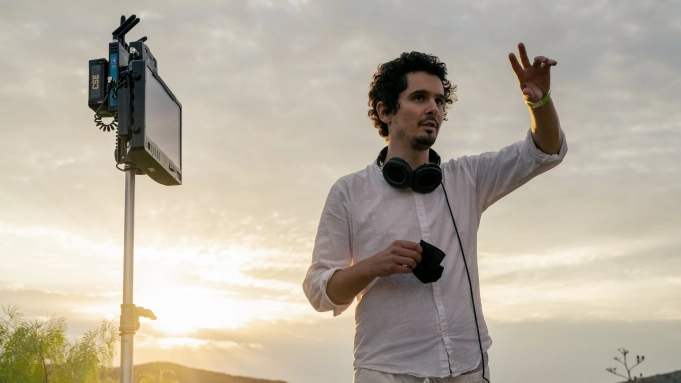Blogs
The Lesson of ‘Babylon’: Every Great Filmmaker Has to Fall on Their Face Once and Learn From It
Watching Damien Chazelle’s “Babylon,” in all its superficially titillating, occasionally exciting and mostly exhausting wretched excess (the orgies, the elephant poop, the contempo actors overdoing it as dawn-of-cinema stars, the general air of cynical performative effrontery), I thought to myself: We’ve been here before, so many times.
You sit down to watch a movie by a director whose work you love. He’s swinging for the fences. His ambition is on full display and so, in fits and spurts, is his talent. Yet something else is on display too: a lack of judgment that starts out like a worm, wriggling through the proceedings, before growing and metastasizing until it’s eating everything in its path.
I’ll leave the D-word out of this, since “Babylon,” a watchable if weirdly joyless movie, never turns into a disaster of incoherence like, say, “Amsterdam.” Yet the movie reminded me of how many great directors have had a compulsive epic misfire in them. Probably most of them; it may be inherent in the imagination of moviemaking. I’m thinking of Francis Ford Coppola and “One from the Heart,” Steven Spielberg and “1941,” or Martin Scorsese and “New York, New York,” a debauched ramble of a Method musical that, I’m sorry, does not hold up. I’m thinking of David Lynch and “Wild at Heart,” Steven Soderbergh and “Kafka,” Michelangelo Antonioni and “Zabriskie Point,” Baz Luhrmann and “Australia,” or even (dare I say it?) Stanley Kubrick and “Eyes Wide Shut.” (We can debate that one another time, but after numerous viewings I still don’t think it jells.)
My point is that great filmmakers, in following their muse, sometimes need to let themselves go out there — too far out there — in order to return to earth. Each colossal movie failure is different; each one writes its own rules for what not to do going forward. But film directors, who tend to regard each movie they make as if it were one of their own children, are often very protective of their big duds, for understandable reasons. Directing a movie can be an impossible job. Those who make movies need to feel that even the ones that didn’t go over were worth doing. Yet the lessons can creep up on them. Especially if they really did build a movie around a mistake, which is what I think Damien Chazelle did in “Babylon.”
Chazelle has been on the map since 2014, during which time he’s made four films, two of which I love, one of which, I think, is good and underrated. Have you seen “Whiplash” recently? I found it even more gripping the second time — a percussive jazz psychodrama, centered around a charismatic teacher from hell, that’s built like a runaway riff that won’t stop. “La La Land,” a musical that’s a virtuoso fusion of the old and the new (just what Scorsese was trying to pull off in “New York, New York”), achieves a quality of ecstatic nostalgia and bittersweet heavenly yearning. It’s an addictive movie (I’ve seen it nearly a dozen times). And “First Man,” while not on that level, dramatized the American moon landing with such a clear-eyed apprehension of the perils of space travel — the hurtling apocalypse beneath the smooth glide — that if you got on the film’s wavelength (which many didn’t), you felt the stakes in every scene.
One of the reasons I think Damien Chazelle is an important filmmaker — the artist he reminds me of most is Spielberg — is that, in each of those three films, he’s crafting a tale of faith. Not religious faith per se, but faith in something (the salvation of music, the promise of love, the evolutionary need for exploration) that is ardent, total, sustaining. A kind of gaga-eyed belief in the stories he’s telling has been Chazelle’s defining quality as a filmmaker. Which is why “Babylon” is such an overwrought oddball. Chazelle, of course, has every right to shift gears and make a sardonic, side-eyed riff on the debauchery of Old Hollywood. And he has every right to make a film that’s less a docudrama than a coruscating historical fantasia.
For all that, the hook of “Babylon” is that Chazelle is presenting the formative days of Hollywood with a bracing warts-and-all semiotic reality. He’s trying to go deeper than other portrayals, to lay the underbelly of the dream factory bare. It’s become a cultural tic to dismiss the authenticity of Kenneth Anger’s “Hollywood Babylon,” a compendium of sordid stories (of sex, drugs, murder) that was first published in France in 1959, but even though that book presented itself as unverified gossip, much of it (though not all of it) really happened, and the mythology it helped to create, about the dirty hidden truth of celebrity in the 20th century, is part of what Chazelle was aiming for.
But “Babylon,” in the largest sense, really is inauthentic. The movie packs in a thousand meticulously researched details, yet its driving sense of excess is fundamentally anachronistic and overblown, whether it’s Margot Robbie’s 1980s-style wild dancing at a party or the way that the depravity on display all seems to take place in a hermetic counterculture bubble removed from the corridors of power.
Kenneth Anger, in his derisive dark way, perceived the grandeur of Hollywood. The scandals he presented became part of its underground mystique, but for Anger everything about Hollywood, even its depravity, was larger than life. What’s missing from “Babylon” is any sense that Hollywood was a dream factory fueled by… well, dreams. The assembly-line filming of silent-movie two-reelers, in which Robbie’s Nellie LaRoy first proves her mettle as a star who can bawdy-dance and cry on cue, is staged with promising ingenuity. But when the film reaches the sound era, the closest it comes to showing us what moviemaking is about is the scene of maladroit studio-set logistics in which Nellie has to keep shooting the same entrance and phone conversation over and over again, until the cameraman literally expires in his hot-box chamber. That’s as close as we get to the joy of filmmaking in “Babylon.”
But the whole reason that Hollywood propelled itself, especially in the ’20s, as the industry version of a castle in the air is that it produced movies with magic in them, and the people who made those movies (or at least some of them) meant what they were doing. It wasn’t just a cynical shitshow. You would barely guess this from “Babylon,” with its heightened Mad-magazine aesthetic of over-the-top flamboyance and nose-thumbing.
Watching the movie, what I couldn’t fathom is how Damien Chazelle, a disciple of the faith of cinema as surely as any filmmaker alive, could think that this brand of reflexive undercutting represented some sort of higher truth. One of the inevitable conversation pieces in “Babylon” is its movie-montage finale, in which Chazelle uses a rapid-fire psychedelic feast of famous film clips to send us out on a floating cloud of cinema love. But all I could think was: I wish a meeting could be arranged between that sequence and the film’s previous three hours. What “Babylon” doesn’t have, oddly enough, is a movie love that you can feel in your bones. It shows us the happenstance beauty of a sunset kiss in the silent era, and the nicely written speech that Jean Smart’s gossip columnist delivers evokes a wistful sense of the cyclical nature of cinema and celebrity. But Damien Chazelle’s belief in the power of movies is, for the most part, what he forgot to bring to the table. That’s the lesson of “Babylon”: that even a great filmmaker can’t just believe in himself.

